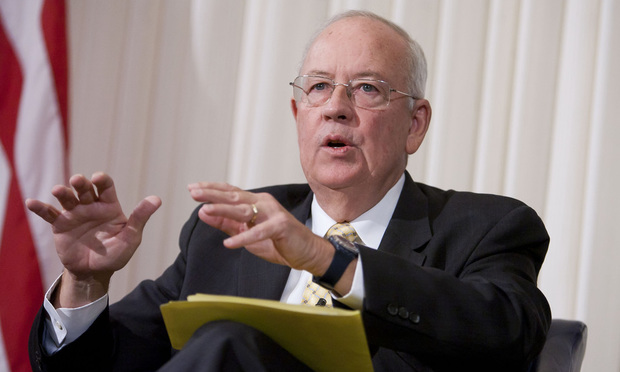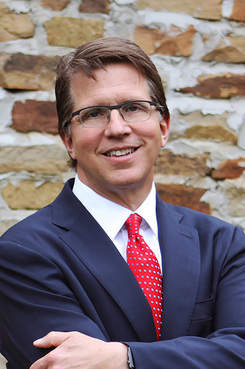Starr, Lanier Talk About Teaming Up in Texas
"We now have added an all-star with two R's [in] Judge Ken Starr,” said Mark Lanier about his longtime personal friend and newly named counsel at The Lanier Law Firm.
August 27, 2018 at 08:00 PM
7 minute read
 Ken Starr.
Ken Starr.
It was Aug. 4, 1984, and Sandra Day O'Connor had a cold.
The former U.S. Supreme Court justice was supposed to preside over the American Bar Association National Moot Court Championships in New York, but was under the weather. Instead, O'Connor asked Kenneth Starr, then a judge on the U.S. Court of Appeals for the District of Columbia Circuit, to fill in and judge the competition.
Competing that year was W. Mark Lanier, a third-year law student at Texas Tech University. Lanier and his team from the TTU School of Law would eventually be crowned national champions, with Lanier winning the coveted honor of best oralist.
“I got to shake his hand,” Lanier fondly recalled. “[Starr] was obviously an up-and-comer in the world and in the bar where the sky was the limit of what he could and would achieve. I was just blown away that I got to meet him.”
From that serendipitous meeting, a friendship matured over the years. On Monday, Lanier confirmed that Starr, a former U.S. solicitor general, will join The Lanier Law Firm as of counsel in Houston.
“It's a very deep, personal friendship and I've long admired what [Lanier] has done and has accomplished,” Starr said. “He's a justice seeker, a justice warrior and I greatly admired that.”
A year before meeting Lanier nearly 25 years ago, Starr, then a litigation partner at Gibson, Dunn & Crutcher, was appointed by President Ronald Reagan to his seat on the D.C. Circuit. Starr resigned from the bench in 1989 after agreeing to become U.S. solicitor general under President George H.W. Bush.
At the end of that Bush administration, Starr joined Kirkland & Ellis as a partner. In 1994, he was tapped to replace current Davis Polk & Wardwell senior counsel Robert Fiske Jr. as independent counsel overseeing several investigations that eventually resulted in the December 1998 impeachment of President Bill Clinton, a matter Starr will address in a book scheduled for release in mid-September.
Five years later, Starr returned to Kirkland before becoming dean of the Pepperdine University School of Law in early 2004. After six years at the Malibu, California-based school, Starr left in 2010 to become president at Baylor University. He would be named chancellor of the school three years later, only to resign in 2016 amid a sexual assault scandal roiling Baylor's campus.
“I resigned [as chancellor] as a matter of conscience,” said Starr, describing his parting with Baylor as “amicable.”
 Mark Lanier.
Mark Lanier.Lanier, who has served as Starr's longtime personal attorney and defended him publicly in the aftermath of the Baylor debacle, also represented him in conversations, negotiations and discussions regarding Starr's separation from the Waco, Texas-based university.
Following his departure from Baylor, which federal tax filings show paid Starr more than $7 million in total compensation between 2014 and 2017, he began dedicating himself to issues of religious liberty. Starr served on the boards of various organizations and worked closely with Advocates International Inc., an Alexandria, Virginia-based nonprofit network of lawyers spread across 120 countries dedicated to working on matters of importance to Christians.
While several Texas-based firms reached out to Starr about his services, he said he had no intention of returning to private practice.
“I said, 'I'm 'honored and flattered but I don't think so,' because I was enjoying my newfound professional freedom,” Starr recalled.
So it was somewhat against the grain, Starr said, when he teamed up with Lanier and his legal team in late 2016 in a battle against Johnson & Johnson and its subsidiary DePuy Orthopaedics Inc. in a dispute over allegedly defective hip implants. A jury would initially award $1.04 billion to the plaintiffs in that case, although a Dallas judge would slash that verdict in half before it was tossed out in its entirety earlier this year by the U.S. Court of Appeals for the Fifth Circuit.
“When I looked further at the case, I felt that the case was mighty, powerful and that [Lanier] and his colleagues on the plaintiffs' committee were on the side of the angels,” Starr said. “So I wanted to be on the side of the angels.”
In his new of counsel position at The Lanier Law Firm, Starr said he'll be called upon by his fellow litigators at the firm to work on specific projects and cases.
The Houston-based litigation boutique has plenty in the pipeline, including some cases looking for an appellate angel to guide them to a Lanier-friendly resolution. In addition to a retrial in the Johnson & Johnson case slated for January 2019, the firm is representing the state of Utah in another case slated for trial next year against U.S. pharmaceutical giant Merck & Co. Inc.
“Within the framework of all that, we now have added an allstar with two R's [in] Judge Ken Starr,” Lanier said. “I already have him on the books […] of not only helping secure our courtroom victories, but helping retain those victories through the appellate system.”
Starr, along with The Lanier Law Firm's other of counsel and renowned former law school professor Arthur Miller, will work with Lanier and his team to suss out appellate issues that could affect the firm's portfolio of cases.
“Both of these gentlemen are absolutely shining stars when it comes to being able to articulate an argument in front of the U.S. Supreme Court, [a] court of appeals or a trial judge, for that matter, and they will both continue to plug along in that regard,” Lanier said.
As Starr prepares for his return to private practice, another of his former colleagues is set to take center stage. U.S. Supreme Court nominee Brett Kavanaugh, Starr's former deputy in the independent counsel's office during his myriad investigations of the Clintons, is set for a confirmation hearing before Congress on Sept. 4.
“He is likely the most qualified member of the federal appellate judiciary to be under consideration for elevation to the high court. He's universally respected and admired,” said Starr about Kavanaugh. “That being said, it's likely to be a very lively confirmation hearing because of the deeply politicized nature of the conversation these days.”
Starr noted that he, a longtime Republican and one-time leading candidate for the U.S. Supreme Court, supported the nominations of liberal-leaning justices Ruth Bader Ginsburg, Stephen Breyer, Sonia Sotomayor and Elena Kagan “because they were eminently qualified.”
“But we just live in different age,” Starr said.
He demurred when asked about potential parallels between the scandals surrounding the Trump administration and Starr's work probing the Clintons. His upcoming book about the latter—”Contempt: A Memoir of the Clinton Investigation“—will touch on such politically sensitive issues. It hits shelves on Sept. 11.
This content has been archived. It is available through our partners, LexisNexis® and Bloomberg Law.
To view this content, please continue to their sites.
Not a Lexis Subscriber?
Subscribe Now
Not a Bloomberg Law Subscriber?
Subscribe Now
NOT FOR REPRINT
© 2025 ALM Global, LLC, All Rights Reserved. Request academic re-use from www.copyright.com. All other uses, submit a request to [email protected]. For more information visit Asset & Logo Licensing.
You Might Like
View All
No Two Wildfires Alike: Lawyers Take Different Legal Strategies in California
5 minute read
Energy Lawyers Field Client Questions as Trump Issues Executive Orders on Industry Funding, Oversight
6 minute read

Holland & Knight Hires Former Davis Wright Tremaine Managing Partner in Seattle
3 minute readTrending Stories
Who Got The Work
J. Brugh Lower of Gibbons has entered an appearance for industrial equipment supplier Devco Corporation in a pending trademark infringement lawsuit. The suit, accusing the defendant of selling knock-off Graco products, was filed Dec. 18 in New Jersey District Court by Rivkin Radler on behalf of Graco Inc. and Graco Minnesota. The case, assigned to U.S. District Judge Zahid N. Quraishi, is 3:24-cv-11294, Graco Inc. et al v. Devco Corporation.
Who Got The Work
Rebecca Maller-Stein and Kent A. Yalowitz of Arnold & Porter Kaye Scholer have entered their appearances for Hanaco Venture Capital and its executives, Lior Prosor and David Frankel, in a pending securities lawsuit. The action, filed on Dec. 24 in New York Southern District Court by Zell, Aron & Co. on behalf of Goldeneye Advisors, accuses the defendants of negligently and fraudulently managing the plaintiff's $1 million investment. The case, assigned to U.S. District Judge Vernon S. Broderick, is 1:24-cv-09918, Goldeneye Advisors, LLC v. Hanaco Venture Capital, Ltd. et al.
Who Got The Work
Attorneys from A&O Shearman has stepped in as defense counsel for Toronto-Dominion Bank and other defendants in a pending securities class action. The suit, filed Dec. 11 in New York Southern District Court by Bleichmar Fonti & Auld, accuses the defendants of concealing the bank's 'pervasive' deficiencies in regards to its compliance with the Bank Secrecy Act and the quality of its anti-money laundering controls. The case, assigned to U.S. District Judge Arun Subramanian, is 1:24-cv-09445, Gonzalez v. The Toronto-Dominion Bank et al.
Who Got The Work
Crown Castle International, a Pennsylvania company providing shared communications infrastructure, has turned to Luke D. Wolf of Gordon Rees Scully Mansukhani to fend off a pending breach-of-contract lawsuit. The court action, filed Nov. 25 in Michigan Eastern District Court by Hooper Hathaway PC on behalf of The Town Residences LLC, accuses Crown Castle of failing to transfer approximately $30,000 in utility payments from T-Mobile in breach of a roof-top lease and assignment agreement. The case, assigned to U.S. District Judge Susan K. Declercq, is 2:24-cv-13131, The Town Residences LLC v. T-Mobile US, Inc. et al.
Who Got The Work
Wilfred P. Coronato and Daniel M. Schwartz of McCarter & English have stepped in as defense counsel to Electrolux Home Products Inc. in a pending product liability lawsuit. The court action, filed Nov. 26 in New York Eastern District Court by Poulos Lopiccolo PC and Nagel Rice LLP on behalf of David Stern, alleges that the defendant's refrigerators’ drawers and shelving repeatedly break and fall apart within months after purchase. The case, assigned to U.S. District Judge Joan M. Azrack, is 2:24-cv-08204, Stern v. Electrolux Home Products, Inc.
Featured Firms
Law Offices of Gary Martin Hays & Associates, P.C.
(470) 294-1674
Law Offices of Mark E. Salomone
(857) 444-6468
Smith & Hassler
(713) 739-1250






